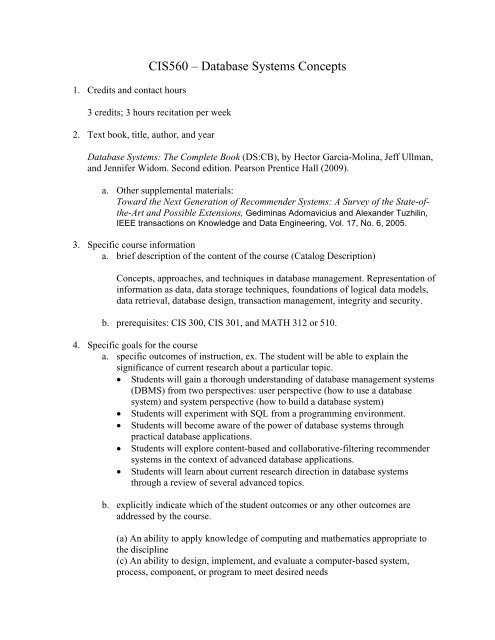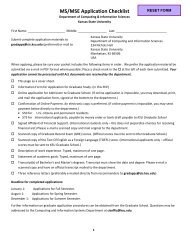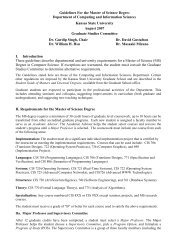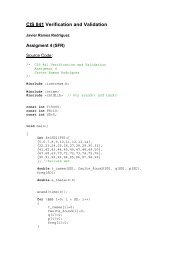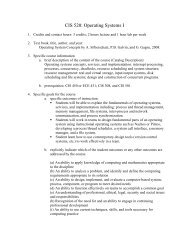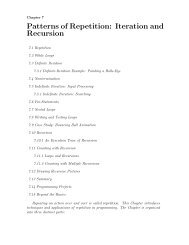CIS560 â Database Systems Concepts - Computing and Information ...
CIS560 â Database Systems Concepts - Computing and Information ...
CIS560 â Database Systems Concepts - Computing and Information ...
Create successful ePaper yourself
Turn your PDF publications into a flip-book with our unique Google optimized e-Paper software.
1. Credits <strong>and</strong> contact hours<br />
<strong>CIS560</strong> – <strong>Database</strong> <strong>Systems</strong> <strong>Concepts</strong><br />
3 credits; 3 hours recitation per week<br />
2. Text book, title, author, <strong>and</strong> year<br />
<strong>Database</strong> <strong>Systems</strong>: The Complete Book (DS:CB), by Hector Garcia-Molina, Jeff Ullman,<br />
<strong>and</strong> Jennifer Widom. Second edition. Pearson Prentice Hall (2009).<br />
a. Other supplemental materials:<br />
Toward the Next Generation of Recommender <strong>Systems</strong>: A Survey of the State-ofthe-Art<br />
<strong>and</strong> Possible Extensions, Gediminas Adomavicius <strong>and</strong> Alex<strong>and</strong>er Tuzhilin,<br />
IEEE transactions on Knowledge <strong>and</strong> Data Engineering, Vol. 17, No. 6, 2005.<br />
3. Specific course information<br />
a. brief description of the content of the course (Catalog Description)<br />
<strong>Concepts</strong>, approaches, <strong>and</strong> techniques in database management. Representation of<br />
information as data, data storage techniques, foundations of logical data models,<br />
data retrieval, database design, transaction management, integrity <strong>and</strong> security.<br />
b. prerequisites: CIS 300, CIS 301, <strong>and</strong> MATH 312 or 510.<br />
4. Specific goals for the course<br />
a. specific outcomes of instruction, ex. The student will be able to explain the<br />
significance of current research about a particular topic.<br />
Students will gain a thorough underst<strong>and</strong>ing of database management systems<br />
(DBMS) from two perspectives: user perspective (how to use a database<br />
system) <strong>and</strong> system perspective (how to build a database system)<br />
Students will experiment with SQL from a programming environment.<br />
Students will become aware of the power of database systems through<br />
practical database applications.<br />
Students will explore content-based <strong>and</strong> collaborative-filtering recommender<br />
systems in the context of advanced database applications.<br />
Students will learn about current research direction in database systems<br />
through a review of several advanced topics.<br />
b. explicitly indicate which of the student outcomes or any other outcomes are<br />
addressed by the course.<br />
(a) An ability to apply knowledge of computing <strong>and</strong> mathematics appropriate to<br />
the discipline<br />
(c) An ability to design, implement, <strong>and</strong> evaluate a computer-based system,<br />
process, component, or program to meet desired needs
(i) An ability to use current techniques, skills, <strong>and</strong> tools necessary for computing<br />
practice<br />
(j) An ability to apply mathematical foundations, algorithmic principles, <strong>and</strong><br />
computer science theory in the modeling <strong>and</strong> design of computer-based systems<br />
in a way that demonstrates comprehension of the tradeoffs involved in design<br />
choices.<br />
(k) An ability to apply design <strong>and</strong> development principles in the construction of<br />
software systems of varying complexity.<br />
5. Brief list of topics to be covered<br />
<strong>Database</strong> <strong>Systems</strong> from a user perspective:<br />
Relational Model<br />
Relational Algebra<br />
SQL <strong>and</strong> DBMS Functionalities:<br />
o SQL Programming<br />
o Queries <strong>and</strong> Updates<br />
o Indexes <strong>and</strong> Views<br />
Constraints <strong>and</strong> Triggers<br />
Relational <strong>Database</strong> Design<br />
o ER <strong>and</strong> UML diagrams<br />
o Functional dependencies <strong>and</strong> normalization<br />
Embedded SQL<br />
<strong>Database</strong> <strong>Systems</strong> from a system perspective:<br />
Data storage <strong>and</strong> indexing<br />
Query execution<br />
Query optimization<br />
(Transaction management)<br />
Special topics:<br />
XML/XPath/XQuery<br />
Parallel <strong>and</strong> Distributed DB<br />
<strong>Information</strong> Integration<br />
Data warehousing/Data mining<br />
Object relational mappers (SQLalchemy).<br />
NoSQL databases<br />
MapReduce/Hadoop/HBase/Pig Latin


